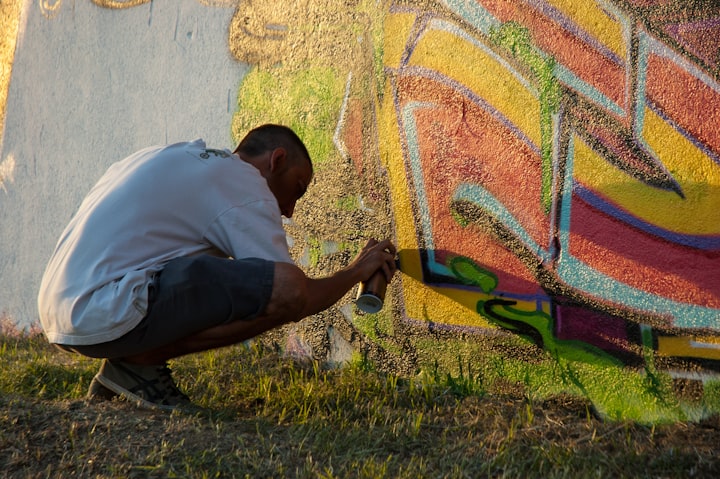Here's How Life Changes When You Admit You're Creative
How to navigate through a world that doesn’t care about your creative needs

You’re a creative person. Admit it. No really, go look in the mirror and say “I’m a creative person.”
It feels weird and pretentious, doesn’t it?
We live in a culture where creativity is celebrated – music, art, talent shows, books, films – but no one is allowed to say they’re creative, that’s not the done thing.
Perhaps this taboo is especially British as we're awkward folk and lean too much into humility, but the oddness of announcing "I'm creative" is definitely there for everyone, one way or another.
It's probably because people mix up creativity with talent; you’re not saying you’re talented, you’re just acknowledging you have a drive to express yourself through some form of art.
For those of us who have it, the drive is real, a need that must be met.
Having this need is uncomfortable, most people want comfort, not creativity, most are happy to work in decently paid, process-driven jobs and watch Netflix of an evening.
Which is fine, that's their choice, but you have to realise you are at odds with this world view. You're a sort of freak-genius hybrid and you don't fit in. Here's why...
The bit society doesn't like
Society is set up for people to be cogs in machines, not to drift around being creative. That's not how the economy works. Solicitors and accountants are needed, no one thinks we need more oil painters or science fiction writers (we do, but that's not the point right now). You see, solicitors and accountants commuting to work in stuffy suits are seen as successful, the artist living on a shoestring is seen as a hippy dreamer at best and a liability at worst.
I just wrote “we live in a culture where creativity is celebrated”, but the real truth is that the final, proven-a-success product of creativity is celebrated. Everything else beforehand no one gives a shit about.
Society doesn’t care about the artist’s creative journey. At all.
No one cares if you’re toiling away, writing a book. No one cared about JK Rowling as a struggling author, or even when she was first published, they only cared once she was a billionaire.
This is the way the world works, but it’s also why there’s shame around creativity.
Society doesn’t value your interests. It values only pre-approved results.
No one valued Van Gogh when he was alive. He was a penniless artist bumming around the south of France and was considered both mad and a failure by those who knew him.
Nowadays, any man on the street would say he’s a great artist, but what do they know? That’s what they’ve been told. They've been conditioned to say his work is of value, they don't think it for themselves.
You see how people are told what creativity is valuable, and what isn't?
People’s judgments, therefore, should mean nothing for your creative endeavours.
Who’s place is it to judge art anyway?
John William's novel Stoner sold less than 2,000 copies when it was released in 1965 but it experienced a literary renaissance 40-years later and is now considered a modern classic.
When Herman Melville wrote Moby Dick it was a commercial failure, received mixed reviews, and went out of print by the time Melville died in 1891. Today, it is considered one of the greatest books ever written.
In 1962, Decca Records rejected The Beatles and told them “Guitar groups are on their way out.”
Opinions mean nothing. It is how the creative journey manifests in you that matters.
Here’s how this article will help you
I know what it feels like to have entire systems working against your character, your interests, your dreams. My name is Jamie Jackson and I too am a creative.
What I want you to take away from this article is two things:
1) Understand you’re not alone in the frustration you feel trying to create
2) How to ease this frustration by realising you don’t have to play society’s games of conformity or judgment
The second isn’t easily done, but let me explain how.
Caution: Box-tickers are all around you
I worked in offices for 19 years. During that time I wrote words, essays, lyrics, music, I played in bands, made videos and I performed stand-up comedy.
Every time I spoke to my colleagues about creativity they couldn’t get their heads around it.
The world is full of non-creatives, they’re everywhere; in offices, shops, they’re friends and family, they’re cynical men in pubs, they’re practical, well-meaning individuals who simply don’t care about art.
Slowly and collectively, they will chip away at your confidence, your hopes, your dreams.
You are fighting a war of attrition whether you like it or not. This sounds overly dramatic but it’s a fact.
Those closest to you will try to pop your bubble, they will want you to settle into a stable job and stop rocking your boat as it also rocks theirs.
People will interfere and offer up “realistic” solutions and lukewarm alternatives to your passions, but as Will Smith said:
“Being realistic is the most common path to mediocrity.”
I used to ask older work colleagues what I should do with my life. For 19 years, the answer I received was always the same: “Stay here, climb the corporate ladder, save your money to get a deposit on a property, top-up your pension fund, and hold on for retirement.”
Surely there is more to life than just getting through it?
For the longest time, I felt like a square peg in a round, corporate hole. Worse, I began to forget who I was. 19 years of corporate immersion made limited, box-ticking thinking seem normal.
Environment beats willpower, so do this
Surround yourself with other creatives. You must soak up and absorb the creative energy of others, else have it sapped from you.
When I played music, I met people who were free-spirits, they cared about art and had no interest in secure salaries and pensions. It blew my mind. They lived in warehouses, obsessed over music, they knew who they were even if society judged them for it.
With comedy, I met people who truly believed in the power of their art, I met actors, musical theatre singers, those who did comedy full time.
Their creativity seeped into me through osmosis.
Epiphanies also came. One evening, I was explaining to an acting friend about a board meeting I had at work, and he replied;
“I’ve never been to a meeting.”
This blew my mind. He was 60 and managed to avoid corporate bullshit his whole life! It made me realise there was another way to live.
Here’s how you need to look at it
The world is full of people who don’t understand creativity, so why let them give you advice?
If a cat advised a bird how to live, it would never fly.
When I spoke to my office colleagues it was like talking to a caveman about television, there was no way for them to conceptualise my point of view and I couldn’t conceptualise theirs.
The idea of endless conformity and working to make someone else rich seemed like madness. I’m sure they thought I was mad too.
Being around people who don’t see life as you do is isolating.
Not at first, at first, it will be an education, but leave before isolation takes hold — and it will come. Humans are connection machines and you must find your tribe to flourish and bloom.
Over the years I’ve felt a great deal of confusion and dissonance with my surroundings because I was speaking in creative and everyone else was speaking in consumption.
Never let someone who’s given up on their dreams talk you out of yours.
You are a dreamer
All creatives are dreamers. They pull ideas out of thin air and turn them into reality. As ee cummings wrote,
“Your head is a living forest full of songbirds.”
It needs to be protected and nurtured if you want to hear its tune, not deforested by cynicism and office drudgery. Your creativity is under attack by the noise of conformity every day, in a thousand subtle ways.
Dreams aren’t burst in an insistent but are instead slowly deflated over time.
But you are a creative; whilst everyone is looking down, you are looking up, whilst everyone is counting cash, you are counting ideas, whilst everyone consumes, you create.
You didn’t choose this life, it chose you.
Listen to it, use it, let it be your guide. You’re not going to change so you may as well surrender to it. Remember, incongruence is the opposite of happiness.
Free yourself from the shackles of judgment and surround yourself with those who understand. Why wait?
As Henry Rollins said:
"There's no such thing as spare time, no such thing as free time, no such thing as down time. All you got is life time. Go.”
About the Creator
Jamie Jackson
Between two skies and towards the night.






Comments
There are no comments for this story
Be the first to respond and start the conversation.